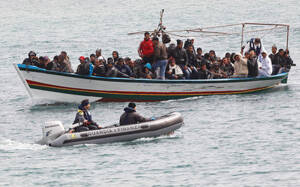More than 22,000 boat people, many fleeing political unrest in North Africa, have arrived on the tiny Italian island of Lampedusa this year. The growing intensity of the fighting in Libya has spurred more people to flee in recent weeks. Not all survive the trip. About 150 people drowned on April 6 when their boat capsized in rough seas. The new flow of North African immigrants into Italy is putting church teaching on immigration to the test.
Church leaders have underlined the broad right to emigrate, the specific rights of refugees and the responsibility of wealthier nations to welcome those in need. But their moral advocacy has provoked criticism and even derision among some Italians. Because Lampedusa lies only 90 miles off the North African coast, it has long been the gateway to Europe for North Africans. Residents have complained that the island’s infrastructure is overwhelmed. Authorities have been relocating new arrivals to other Italian regions—whose residents seem not to want them either.
Cardinal Angelo Bagnasco, president of the Italian bishops’ conference, has called on Europe to recognize that Italy cannot handle the migration flow by itself. European bishops meeting on April 3 agreed, arguing that the crisis “requires the solidarity of all European countries and their institutions.” But Cardinal Bagnasco also reminded Italians that the current immigration emergency stems in part from long-standing global inequities. He said Europe cannot keep out the world’s poor simply by patrolling its borders.
“It is an illusion to think that one can live in peace, keeping at a distance young populations that are burdened by deprivation and that are legitimately trying to satisfy their hunger,” the cardinal said. Persuading these people to remain in their homeland will require implementation of “policies of true cooperation,” he said.
The church suffered a significant political backlash in the current climate. Several groups and newspapers proposed that the Vatican open up convents, seminaries and its own unrented apartments to immigrants. In fact, Caritas Italy has already arranged to lodge some 2,500 in church institutions. Church leaders said they wanted to show that they practice what they preach and called on all Italians to make a “new effort of solidarity,” despite the nation’s own prolonged economic downturn.
This is not a popular message these days, but it is very much part of traditional church teaching on immigration. The responsibility to welcome the stranger has roots in the Bible, and as Pope Benedict XVI recently noted, Jesus was himself a refugee when the Holy Family fled into Egypt. The “right to emigrate” was defended in 1952 in an apostolic constitution by Pope Pius XII, who also noted that states may control the flow of migration, but not for arbitrary reasons.
Immigrants make up 7.5 percent of Italy’s population. Demographers say that immigrants, most of whom are young, help balance Italy’s aging population and low birth rate. But some political parties maintain that immigration has reached the saturation point.
Archbishop Antonio Veglio, president of the Pontifical Council for Migrants and Travelers, has said that while governments have a legitimate right to regulate immigration, “there is nevertheless the human right to be rescued and given emergency help.” Behind that statement lies a fact sometimes cited by church experts: Over the past 23 years, more than 15,000 migrants have died trying to reach Europe—a toll that grows daily.








